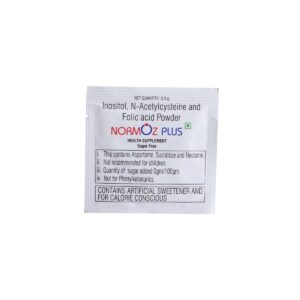VIT D 3 + MYO-INOSITOL.L-METHYLFOLATE
Vit D 3: Vitamin D3, also known as cholecalciferol, is a fat-soluble vitamin that plays a vital role in maintaining proper bone health. It is primarily used to treat or prevent vitamin D deficiency and related conditions, such as rickets, osteomalacia, and osteoporosis.
The mechanism of action of vitamin D3 involves its influence on calcium and phosphate metabolism. When the skin is exposed to sunlight, a precursor molecule in the skin is converted to cholecalciferol, which is then further processed in the liver and kidneys to its active form, calcitriol. Calcitriol enhances the absorption of calcium and phosphate from the intestines, promotes their reabsorption in the kidneys, and helps in their deposition in the bones.
The dosage of vitamin D3 varies depending on individual needs and the severity of vitamin D deficiency. However, a commonly recommended daily dose for adults is 600-800 international units (IU). Higher doses may be required for severe cases. It is best to consult a healthcare professional to determine the appropriate dose for your specific situation.
Side effects of vitamin D3 are rare when taken in appropriate doses. However, excessive intake of vitamin D3 can lead to hypervitaminosis D, which may cause symptoms such as nausea, vomiting, poor appetite, constipation, weakness, and increased thirst. Long-term excessive intake of vitamin D3 can also lead to the accumulation of calcium in the blood, leading to hypercalcemia, which can have serious health consequences.
It is important to note that vitamin D3 is not solely obtained through diet but is predominantly synthesized in the skin through sunlight exposure. However, supplementation may be necessary for individuals who have limited sun exposure or have conditions that impair vitamin D absorption. It is always recommended to consult a healthcare professional before starting any vitamin D3 supplementation.
Myo-Inositol.l-Methylfolate: Myo-Inositol/l-Methylfolate is a combination drug used as a dietary supplement. It is commonly prescribed to treat certain conditions like PCOS (Polycystic Ovarian Syndrome) and depression.
The mechanism of action of Myo-Inositol involves its ability to restore the balance of chemicals in the body, especially in the brain. Myo-Inositol belongs to the family of B-complex vitamins and acts as a precursor for second messengers involved in various cell signaling pathways. It is believed to improve insulin sensitivity, regulate ovarian function, and reduce symptoms associated with depression.
l-Methylfolate, also known as L-MTHF or levomefolate, is the active form of folate that plays a crucial role in the synthesis of DNA and neurotransmitters like serotonin, dopamine, and norepinephrine. It is involved in the methylation cycle, which is important for normal brain function.
The usual recommended dose of Myo-Inositol/l-Methylfolate varies depending on the condition being treated. For PCOS, the typical dose is 1,200-4,000 mg of Myo-Inositol combined with 400-1,000 mcg of l-Methylfolate per day. For depression, the dose ranges from 15-30 mg of l-Methylfolate per day. It is important to follow the recommended dosage provided by the healthcare provider.
Common side effects of Myo-Inositol/l-Methylfolate are usually mild and include gastrointestinal symptoms such as nausea, stomach pain, and diarrhea. Allergic reactions may occur in rare cases, resulting in rash, itching, or swelling.
As with any medication, it is important to consult with a healthcare professional before starting Myo-Inositol/l-Methylfolate to determine the appropriate dosage and to discuss potential drug interactions or contraindications.

